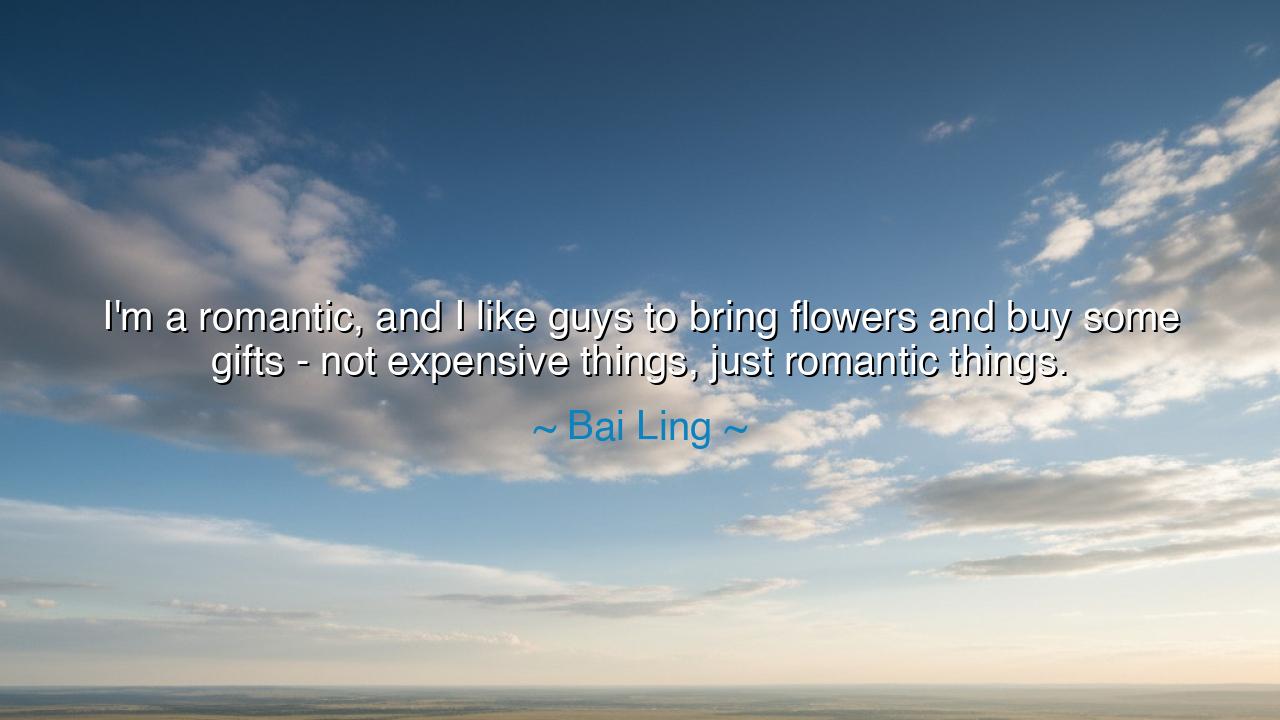
I'm a romantic, and I like guys to bring flowers and buy some
I'm a romantic, and I like guys to bring flowers and buy some gifts - not expensive things, just romantic things.






Listen closely, O seekers of wisdom, for the words of Bai Ling carry within them a profound truth about the nature of romantic gestures and the deep human longing for connection and affection. In a world where love often seems to be measured by grand gestures or expensive tokens, Bai Ling calls us back to the simple, pure acts of romanticism—the giving of flowers, the offering of small, thoughtful gifts, not for their material value, but for the emotion they carry. It is a romantic ideal, one that speaks to the heart, reminding us that love is found not in the price we pay, but in the intent and heartfelt meaning behind our actions.
Consider the significance of flowers—how delicate, how fleeting, how full of meaning they are. A simple bouquet of wildflowers can speak volumes of the affections one holds for another, carrying a message that transcends words. It is not the cost of the flowers that makes them precious, but the thought behind the gesture. The same can be said of gifts—it is not the grandness of the offering, but the personal touch, the sense that one has paid attention to the other’s desires, that imbues the act with meaning. Bai Ling’s words are a call to remember that true romance lies in gesture, in thoughtfulness, in the small acts that show the depth of our feelings, rather than in the grand displays meant to impress.
Let us reflect, O wise ones, on the nature of romanticism. It is not merely a passing fancy, a fleeting notion of love. No, romanticism is the soul’s call to beauty, to simplicity, to the genuine connection that exists between two hearts. It is found in the subtle exchanges, the small tokens of affection that show that we are seen, that we are valued. How often have we been touched by the simple act of someone remembering our favorite flower or bringing us something meaningful, however small, without expectation of grandeur? These gestures, though humble, are the ones that stay with us long after the grand displays fade away. They remind us that love is not about wealth or outward appearance, but about the depth of feeling and the sincerity of heart.
Consider, if you will, the story of Napoleon and Josephine—a relationship that, though marked by the weight of empire, was also filled with deeply personal and intimate moments of romance. Napoleon, in the midst of his campaigns, would often send Josephine small tokens of his affection—flowers, love letters, trinkets of sentimental value, though he was surrounded by the treasures of the world. It is said that in one of his letters, he expressed that it was not the glory of battle he cherished most, but the memory of his beloved Josephine, and that her love was worth more than any victory. This simple, yet powerful act of love, based on small, meaningful gestures, speaks to the very heart of what Bai Ling is reminding us: that romance does not need to be lavish or expensive to be genuine and impactful.
And what of the great poets of the past, who, though they lived in times of war and strife, could still find the time to pen verses of love? Pablo Neruda, the poet of passion, often spoke of the beauty found in the smallest things—the smell of roses, the gentle touch of a lover, the quiet companionship of those who understand us. He, too, was a romantic, seeing the world through the lens of affection, cherishing the simple moments that often go unnoticed. For him, it was not the grand gestures that held the greatest meaning, but the quiet, unspoken acts of love—those that were given freely, without the expectation of anything in return. It is these acts that Bai Ling speaks of when she declares that she is a romantic at heart.
And so, O seeker of wisdom, what lesson can we take from Bai Ling’s declaration? It is this: that true romance is not about the value of what is given, but about the intention and thoughtfulness behind it. To love, truly love, is to pay attention to the details, to the small things that make another feel special, seen, and cherished. In a world that often prizes the extravagant, let us remember that it is the small, intimate gestures that reveal the truest form of affection. Whether it is a flower, a kind word, or a carefully chosen gift, these are the things that touch the heart.
In your own life, O wise traveler, seek to be a bearer of such romantic gifts. Let your love not be measured by the wealth you can offer, but by the depth of your care. When you wish to express your affection, let it be in the small things—those that will endure long after the glitter of material wealth fades. And remember, it is the thought, not the cost, that makes the gesture meaningful. In this, you will discover the true power of love: in the quiet, heartfelt moments that pass between you and another, without need for grandeur, but full of the deepest, most genuine affection.






AAdministratorAdministrator
Welcome, honored guests. Please leave a comment, we will respond soon